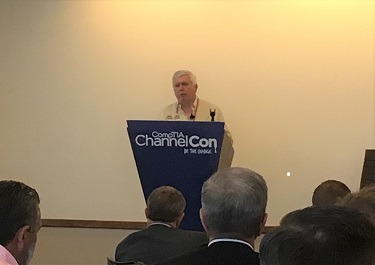 Those in the tech industry tend to throw around certain terms rather loosely. Words like "channel" and "partner" have lost their meaning somewhat over the past two decades as new business models shift and reshape their value to the IT services community. Reselling has become somewhat passé. And the continually changing description of what it means to be an MSP or cloud provider is further muddling the conversation.
Those in the tech industry tend to throw around certain terms rather loosely. Words like "channel" and "partner" have lost their meaning somewhat over the past two decades as new business models shift and reshape their value to the IT services community. Reselling has become somewhat passé. And the continually changing description of what it means to be an MSP or cloud provider is further muddling the conversation.
Of course, the terminology changes underlie the deeper transition taking place. Business technology is no longer just about components and networks. The real focus has shifted to problem-solving, efficiency, and differentiation. That continuing conversation is where specialized partners come in.
During CompTIA's joint council meetings at ChannelCon, Rod Baptie, CEO of Baptie & Co. shared insight on this evolving channel segment and where these new players fit in the general IT community. "SaaS is changing the equation," he emphasized. "Today's businesses want to work with partners who understand their operations and the issues they face every day, not just IT."
 In his presentation, Baptie pointed out the growth in professional services practices such as accounting, advertising and HR consulting; and how escalating competition in those industries is forcing firms to seek other profit generating activities. "Their traditional business model is under price pressure, so branching into more lucrative roles such as IT consultation can be a logical, potentially more lucrative fit."
In his presentation, Baptie pointed out the growth in professional services practices such as accounting, advertising and HR consulting; and how escalating competition in those industries is forcing firms to seek other profit generating activities. "Their traditional business model is under price pressure, so branching into more lucrative roles such as IT consultation can be a logical, potentially more lucrative fit."
These companies have the deep pockets it takes to build and scale a successful IT services practice. With tens of billions in revenue each year, these firms have access to the capital and other resources needed to hire skilled technical and sales professionals, purchase the required tools, and develop demand generation programs. That process is easier than ever before with the cloud, SaaS, and managed services.
These professional organizations turned IT specialists can be both a threat and an opportunity for the channel. CPAs, attorneys, marketing experts and other professionals understand business. Most have earned the trust of their clients and can openly discuss their operational objectives and challenges. They may also have greater access to budget details and those who make purchasing decisions, with more eyes and ears on their customers' day to day processes than the typical IT services professional.
Key Differentiators
 "The specialized partner is interested in recurring revenue, not in billing the customer for those services," emphasized Baptie. "And 95% of them don't buy through distribution…ever." That distinction creates a true partnership opportunity for focused IT firms. Channel companies can provide the technical support, implementation expertise and billing infrastructure to fill the gaps and help manage the things those professionals can't, or don't wish to, offer their clients.
"The specialized partner is interested in recurring revenue, not in billing the customer for those services," emphasized Baptie. "And 95% of them don't buy through distribution…ever." That distinction creates a true partnership opportunity for focused IT firms. Channel companies can provide the technical support, implementation expertise and billing infrastructure to fill the gaps and help manage the things those professionals can't, or don't wish to, offer their clients.
That's why it's important to note the difference between cloud partners and specialized partners. "The latter has more vertical focus and wants the vendor to bill the customer," added Baptie. "The specialized partner usually offers x, y, and z; and tells them ‘here's what it will cost.' The cloud partner, on the other hand, typically offers everything to the customer in one branded service.
He also highlighted how "specialized partners tend to think outside the box, not where traditional IT companies have been, and focus on enhancing their value to their customers." One approach for partnering with these firms? Show them how your company can make their firm look even better. "Enable them to bolt on their professional services, not the technical components. But specialized partners will want a solid business plan. They'll want to know what your company can do to help and how you can bring them up to speed."
Where Do They Belong?
 In the joint ChannelCon session, council members broke up into their respective groups to discuss how and where these non-IT professionals best fit in their business models. After brainstorming ideas for engaging these communities and previous experiences, as well as best practices for expanding these relationships, they collectively discussed their findings.
In the joint ChannelCon session, council members broke up into their respective groups to discuss how and where these non-IT professionals best fit in their business models. After brainstorming ideas for engaging these communities and previous experiences, as well as best practices for expanding these relationships, they collectively discussed their findings.
Council members concluded that specialized partners prefer working with vendors that can provide marketing support and drive new client engagement (much like today's VARs and MSPs). They discussed how those firms are more likely to seek help from distributors that offer sales and technical expertise, and insight into compliance-related solutions and knowledge of their customers' unique business practices.
Partner Advisory Council members conclusions were quite similar. With the continued digital transformation of business, many MSPs realize they cannot possibly do everything themselves anymore. They can benefit from partnering with professionals who can translate the language and focus on their shared clients' intended business outcomes. If they engage successfully, their collective sales opportunities and retention rates will undoubtedly rise.
Recruitment can be a challenge. Channel firms need to develop alliances with local associations and community groups to identify quality partner prospects. Which specialists have the capacity and the desire to forge the most beneficial alliances? Are local CPAs, lawyers and other vertical professionals already offering some form of IT services in their communities? If so, would partnering with an MSP, vendor or distributor be beneficial?
Fortunately for the channel, the business relationship is not all it takes to be successful in IT. Those who can find qualified non-IT professionals partner prospects, and develop workable rules of engagement, have a real opportunity to expand their customer base and portfolios. Of course, they'll have to work out details such as referral fees, service margins, and bonuses for bringing in new clients and strengthening relationships with existing customers.
Is the growth of specialized partners good news for the channel? The long-term business prospects may not be readily apparent yet, but according to those in the joint council discussions at ChannelCon, these tech alliances are worth investigating.

